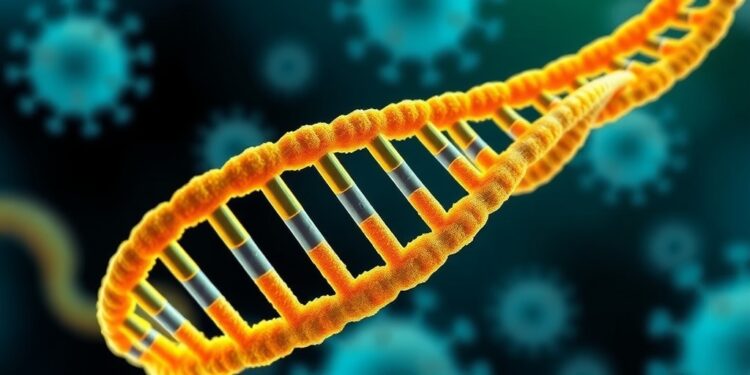Researchers from the University of Cologne and University Hospital Cologne have unveiled significant insights regarding the long-term impact of mRNA-based COVID-19 vaccines. Their recently published study titled "Persistent epigenetic memory of SARS-CoV-2 mRNA vaccination in monocyte-derived macrophages" demonstrates that vaccination not only generates adaptive immune responses but also induces lasting epigenetic modifications in innate immune cells. This pioneering research sheds light on how mRNA vaccines influence the immune system’s ability to respond to future threats, with findings that could inform new vaccination strategies against various infectious diseases.
The dual functionalities of the immune system comprise the innate and the adaptive responses. The innate immune system serves as the body’s first line of defense, responding to pathogens swiftly and non-specifically. Conversely, the adaptive immune system tailors its responses to specific pathogens, with memory cells that adapt to recognize and combat returning threats. The new research, conducted by an esteemed team led by Professor Dr. Jan Rybniker and Dr. Robert Hänsel-Hertsch, elucidates how mRNA vaccines like those deployed against COVID-19 can enhance the innate immune system’s memory through epigenetic changes.
The research identified that vaccination leads to the acetylation of histones, proteins that help package DNA. Through this reversible modification, the structure of DNA changes in a way that affects gene expression without altering the underlying genetic code. The researchers discovered that this epigenetic training elevates the immune system’s readiness to confront a broader range of pathogens beyond those specifically targeted by the vaccine, which could lead to a more robust immune response in future encounters with various infectious agents.
As part of their investigation, the researchers examined monocytes, a type of white blood cell that can differentiate into macrophages, fundamental components of the innate immune system. These macrophages are adept at rapidly identifying and engulfing pathogens, thus playing a crucial role in immune defense. The longitudinal analysis performed on blood samples from vaccinated subjects revealed that the mRNA-based COVID-19 vaccines caused profound, persistent changes via acetylation, affecting genes within these monocytes that have significant immunological implications.
This research documented that the epigenetic modifications persisted for at least six months following vaccination, underscoring the concept that mRNA vaccines provide long-term training for the immune system. Given that human monocytes typically have a brief lifespan of about three days in circulation, the researchers posited that the precursor cells in the bone marrow also retain these epigenetic markers, allowing for ongoing immune responsiveness even after the monocytes themselves are no longer present.
The findings underscore the necessity of multiple vaccinations to effectively induce these enduring epigenetic changes in the immune system. A solitary dose of an mRNA vaccine proved insufficient to garner these modifications, with the data emphasizing that either two sequential vaccinations or one booster shot is essential for achieving optimally sustained immune reactions over time.
The enhanced epigenetic landscape leads to increased transcription of pro-inflammatory genes—a process that catalyzes the production of cytokines, essential signaling molecules that activate a wide array of immune cells. This heightened activation of the innate immune system could confer broader protection against a variety of viral and bacterial pathogens, suggesting that mRNA vaccines might offer unexpected benefits beyond their primary design against SARS-CoV-2.
Dr. Sebastian Theobald, another key author of the study, remarked on the implications of these findings, indicating that the innate immune system’s activation equips it to tackle multiple pathogens in a non-specific but effective manner. This could open pathways for vaccines to be developed that not only target specific infectious agents but also enhance general immune resilience against a wide array of infections.
The study also highlights the role of guanine quadruplex DNA structures formed by specific genes upon histone modifications in macrophages. These intricate molecular formations may play a pivotal role in sustaining immunological memory, marking an exciting intersection of epigenetics and immunology that warrants further investigation.
As researchers build upon these foundational findings, a new horizon emerges for vaccination strategies against COVID-19 and beyond. The robustness of these insights can inform future clinical trials aimed at evaluating the long-term effects of mRNA vaccines not only in healthy individuals but also in vulnerable populations, including those with compromised immune systems.
The implications of this research extend far beyond the context of the ongoing pandemic; they reveal a complex tapestry of immune response capabilities that mRNA vaccines can potentially harness. The dual actions of generating acquired immunity while simultaneously fortifying innate immune capabilities could redefine our approach to global health challenges.
In summary, the University of Cologne and University Hospital Cologne’s findings illuminate a previously unrecognized dimension of mRNA vaccine functionality, underscoring the need for expanded research and clinical trials that could lead to transformative advances in how vaccines can be developed and deployed across various infectious diseases.
Subject of Research:
Article Title: Persistent epigenetic memory of SARS-CoV-2 mRNA vaccination in monocyte-derived macrophages
News Publication Date: 25-Mar-2025
Web References: DOI
References: N/A
Image Credits: N/A
Keywords: mRNA vaccines, innate immunity, epigenetics, macrophages, cytokines, immune response, COVID-19, vaccination strategies.




